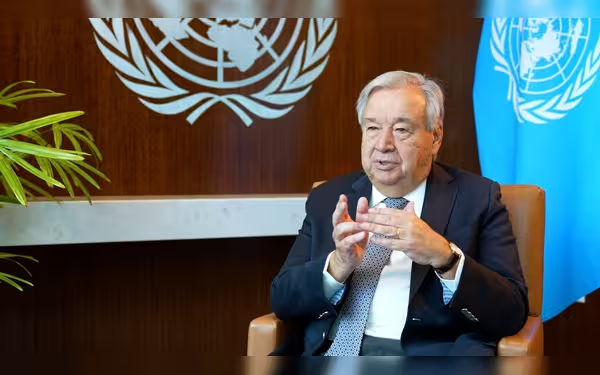Saturday, November 16, 2024 05:59 PM
UN Chief Warns Against Lebanon Becoming Another Gaza
- Guterres stresses urgent need to prevent chaos in Lebanon.
- Calls for two-state solution to Israeli-Palestinian conflict.
- Emphasizes importance of dialogue and negotiation for peace.
 Image Credits: arabnewspk
Image Credits: arabnewspkUN Chief Antonio Guterres warns against Lebanon becoming another Gaza, urging for peace and a two-state solution amid escalating violence.
In recent weeks, tensions in the Middle East have escalated dramatically, particularly between Israel and the Iran-backed Hezbollah militia in Lebanon. The situation has become increasingly dire, with recent attacks resulting in the deaths of 37 individuals and injuring over 3,000. This alarming rise in violence has prompted UN Secretary-General Antonio Guterres to express grave concerns about the potential for Lebanon to descend into chaos similar to that of Gaza.
During an exclusive interview, Guterres emphasized the urgent need to prevent Lebanon from becoming another Gaza, stating, "We cannot allow Lebanon to become another Gaza." His remarks come as the region faces the threat of an all-out war, which he insists must be avoided at all costs. The recent attacks, described as a serious escalation, have raised fears of a broader conflict that could have devastating consequences for civilians.
Guterres highlighted the importance of de-escalation and negotiation, urging all parties involved to prioritize peace. He noted that the ongoing war in Gaza has exceeded expectations in terms of its duration and the level of destruction inflicted upon the civilian population. He condemned the October 7 attacks by Hamas but reiterated that such actions do not justify the collective punishment of the Palestinian people.
When questioned about the UN's role in the conflict, Guterres clarified that the responsibility for the war lies with those who initiated it. He stated, "The responsibility for the war is of those that make the war," emphasizing that the UN has consistently called for ceasefires and humanitarian assistance since the beginning of hostilities. However, he acknowledged the challenges faced in convincing those unwilling to engage in dialogue.
As the conflict in Gaza approaches its grim one-year anniversary, Guterres expressed sadness over the UN's inability to do more for the people affected by the violence. He attributed this limitation to security concerns and restrictions imposed by Israeli authorities. He reiterated the necessity of a political solution, stating, "There is no humanitarian solution for humanitarian problems. The solution is always political. That is why we need to stop the war."
In light of the ongoing violence, Guterres called for a two-state solution to resolve the Israeli-Palestinian conflict, emphasizing that lasting peace can only be achieved through serious negotiations. He also pointed out the limitations of the UN's power, noting that geopolitical dynamics often hinder its effectiveness, particularly within the Security Council.
As the world watches the unfolding crisis, it is crucial to recognize the human cost of the conflict. The images of suffering and destruction in Gaza serve as a stark reminder of the urgent need for peace. Guterres's call to action resonates strongly: the international community must come together to prevent further escalation and work towards a sustainable resolution that prioritizes the well-being of all civilians affected by the violence.
The situation in Lebanon and Gaza underscores the importance of dialogue and diplomacy in resolving conflicts. As the UN Secretary-General aptly stated, the world cannot afford to ignore the lessons of history. The time for action is now, and it is imperative that all parties involved prioritize peace over violence to ensure a better future for the region.













